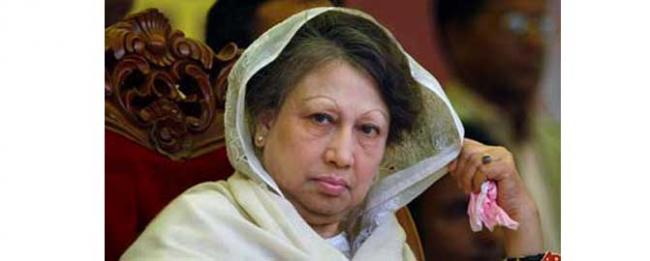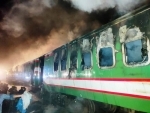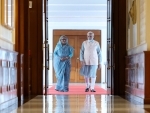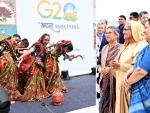Column

Begum Zia’s call to army a desperete measure
A statement by Bangladesh’s opposition leader and former prime minister, Begum Khaleda Zia, suggesting that the country’s army should intervene to sort out the current spate of protests and violence has deepened the tensions between her and the government of her arch political rival, Prime Minister Sheikh Hasina.
Besides being provocative, which is why it has drawn all-round flak, it also indicates her desperation at the continuing marginal role that she and her Bangladesh Nationalist Party (BNP) have been reduced to playing in the current crisis.
Begum Zia and her party are seen as partisan in what is a battle between the Hasina government and the Jamaat-e-Islami. Zia and the BNP are moving against the popular mood and takes away whatever claim they have of having built and nurtured democracy and “Bangladeshi nationalism.”
By supporting Jamaat, they are also seen as against the 1971 freedom movement that is an emotional issue in Bangladesh, as is evident in the continuing mass presence in the social media and at Dhaka’s Shahbagh Avenue.
Begum Zia Zia told a party rally that the army could not play "a silent spectator" and "they will play their due role in proper time if peace remained absent in the country".
Her statement is, of course, cleverly worded. She has referred to the role played abroad by the Bangladesh Army as part of the United Nations Peacekeeping Force and alluded that it should perform a similar role at home too to resolve the current situation.
BNP\'s acting secretary general Mirza Fakhrul Islam Alamgir sought to clarify her comments, saying she was wrongly quoted in media reports.
"BNP does not believe in military interference in politics. She (Zia) had said that the country\'s armed forces work for peacekeeping (abroad under UN missions), and they will do the same, at appropriate time, for the betterment of the nation.
Although all major media had carried identical reports, he said: "The (Zia\'s) message was twisted by some mass media outlets."
Awami League\'s joint secretary General Mahbubul Alam Hanif said that the opposition leader wanted army as "she lost trust in democracy and people".
The mass circulation Daily Star carried an editorial titled \'Khaleda Zia\'s Army baiting; We register our strong protest\' saying, "We are horrified, surprised and somewhat dumfounded by Begum Zia\'s tacit invitation to the Army".
Be that as it may, the import of the statement, reportedly made at a rally, is clear. It is an ‘invitation’; to the army where Zia is reputed to have a strong constituency. This has expectedly and understandably angered the government, the ruling Awami League and its allies and sections of the intelligentsia.
The government has called it ‘vicious’ and the media has termed it undemocratic. There is a clamour that the government should act and government officials have indicated that such a move was under consideration.
This is in keeping with the style of politics in Bangladesh where responses are loud and sharp.
There have been reports of Zia’s move being unprecedented. Even if it is so, Zia’s proximity to and penchant for invoking the army is not new,
Being an off-shoot of the political plans of a military general – late President Ziaur Rahman -- the party has wooed and retained support among the armed forces and among the retired personnel.
There is also a section among Bangladesh’s middle classes that has reaped benefits during the ten years Zia was in power for two terms to be sympathetic to her and the army.
Besides, the continuing political turmoil has time and again given room for a sentiment that the military can sort out a crisis in Bangladesh that has gown with nearly a quarter century of Pakistan’s military culture.
The fact of the matter is that while Zia is seen as pro-army because of its genesis, the Awami League, too, cannot afford to be seen as anti-army. This is despite the role men in uniform played in the assassination of its founding father, Sheikh Mujibur Rahman and several family members of Prime Minister Hasina.
The August 15, 1975 events when the assassination took place have been portrayed by the government that convicted and hanged some of the killers as one led by ‘misguided’ soldiers and not that of the army as a whole. This is also the factual position.
However, Hasina and her party have suspected, and gone to town with accusations against Zia hobnobbing with disgruntled elements within the personnel in uniform.
For instance, Hasina told the National Assembly that Zia had “gone out in a car with windows covered” two days before the then Bangladesh Rifles (BDR), since re-christened Border Guards Bangladesh, staged an armed uprising in February 2009.
“What was she doing? Who was she meeting? She had angrily demanded in Parliament. Zia, not present, did not respond.
On January 21 2012, Hasina accused the "desperate" opposition of "plotting" against her government after the army foiled a coup plot by some "fanatic" serving and retired military officers.
The current mood against Zia’s call, combined with warning, has been summed up by Syed Badrul Ehsan in The Daily Star of March 28, 2013: “Those who flock to hear Khaleda Zia at her rallies must not forget that it was the BNP’s very own, President Abdur Rahman Biswas, who took decisive action against General Nasim when the latter was perceived to be a threat to the established government in 1996. Back in 1982, President Sattar did not or would not act against General Ershad. An entire country paid the price. History teaches us the powerful lesson that when influential people invite the military to step into a preserve not theirs, it is disaster that results. In 1969, Pakistan’s embattled President Ayub Khan, reluctant to hand over power to the Speaker of the National Assembly, Abdul Jabbar Khan, invited General Yahya Khan to take over. The man would go on to preside over a genocide and the break-up of the country two years later.”



